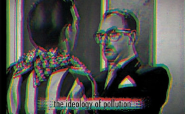| Umělec 1998/2 >> Colorful Culture After Martin Stropnický | Просмотр всех номеров | ||||||||||||
|
|||||||||||||
Colorful Culture After Martin StropnickýUmělec 1998/201.02.1998 Lenka Lindaurová | q&a | en cs |
|||||||||||||
|
When you were appointed to office, you said that among your priorities was the Modern and Contemporary Art Collection of the National Gallery - Veletržní palác. What can be done in the near future so that this institution finally starts to function?
Veletržní palác was one of the first issues that I really had to deal with right after taking my office. I’ve heard about the previous problems despite my geographical distance (Martin Stropnický has served as the Czech Ambassador to Portugal and Italy for the past several years). I’ve spoken about this with my colleagues, other artists and, of course, the National Gallery General Director Martin Zlatohlávek and Veletržní palác director Anděl, and I went to see the opening of the František Kupka exhibition. Analyzing all the facts, it is clear that there is no simple and quick solution to this problem. I will take certain measures now but I do not wish to specify them. On the other hand, it is true that during the length of my short mandate (until the June Parliamentary elections), I cannot manage to push through any system solutions. However, I can help the current situation by taking certain measures and creating conditions for further development. I think it is impossible to defend Kč 60 million ($ 1.714.000 US) spent on the operation of this institution. The decision to turn the Veletržní palác into a gallery was completely wrong. Isn’t it correct then to think about building a more appropriate building for the modern collection from scratch? No, this is not possible. Neither is possible to keep on trying to revive a space that just doesn’t work. At this moment, it is necessary to try and keep the damage as little as possible. The long-term solution for a space presenting modern and contemporary art lies in a “kunsthalle“ model, I think. Are you going to push for some significant change in the way the Culture Ministry works before elections or what is it that you plan to do? My ambition is to create a functioning office and mobilize those issues that have been put off or a long time. I initiated a Euro-office which has started working. It is a relatively small division of the Ministry’s foreign department and we were able to create it without increasing our budget. This division will be in charge of our joining the EU and the Culture Ministry’s involvement. What does the term „cultural policy“ mean to you? Cultural policy as a motto sounds quite terrible. It is, however, a very important, component missing from what the state has decided to deal with, support, maintain and develop. The state reject this role. At the same time, it has to show direction, create laws and ways of alternative financing. This is closely connected with the process of decentralization (i.e. the center has to do well and exactly what it ought to do).
01.02.1998
Рекомендуемые статьи
|
|||||||||||||





Комментарии
Статья не была прокомментированаДобавить новый комментарий